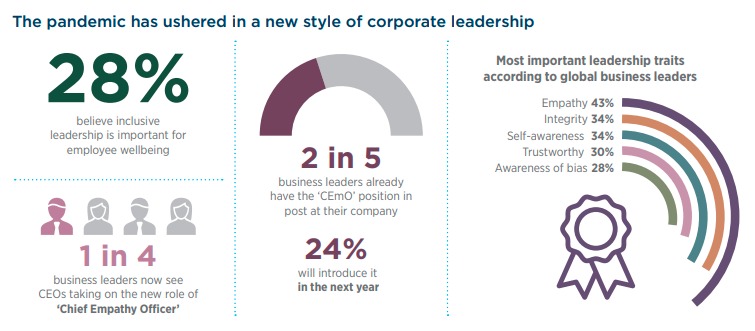22 September 2021: Bupa Global today launches the 2nd edition of the Bupa Global Executive Wellbeing Index analysing the continued effects of the COVID-19 pandemic on the world’s high-net-worth community. The index, which surveyed over 1,200 HNWIs and senior business executives based across Europe, North America, the Middle East and Asia showed that despite concerns about economic recovery and mental health, global executives have been quick to redefine existing working models and corporate values in order to future-proof their businesses.
Mohamad Bazzi, Managing Director of Bupa Egypt Insurance said, “Egypt is the only developing country in our study that experienced positive economic growth during the pandemic, which brings me much optimism as someone who works and lives in the country. However, this year’s data has also unearthed that many of the people in our survey aren’t feeling confident that economic recovery is on its way, which means there is still much to do. As Egyptian businesses navigate through the COVID-19 crisis and into the ‘New Normal’, there has been a renewed focus at an organisational level on employee wellbeing and mental health to help their businesses thrive.”
.jpeg)
Economic Outlook: Not out of the woods yet
The report revealed that, compared to the optimism expressed in 2020, HNWIs in Egypt are still uncertain about the prospect of global economic recovery. 34% believe that their companies have yet to feel the full economic impact of the pandemic, compared to the global average of 9%. This comes as a contrast to the confidence from 2020, when 70% held the opinion that the economy would rebound strongly. This sense of uncertainty is reflected in the data as only 20% of Egypt’s HNWIs are expecting a full local and global economic recovery, similar to surveyed counterparts in United Kingdom (UK), United States of America (USA), France, Singapore, China and Hong Kong.
Mental Health: Persistent challenges require persistent solutions
With global efforts focused on mass rollout of COVID-19 vaccinations and re-openings, the study has shown that the pandemic is still very much at the front and centre of everyone’s attention. Although, the physical impact of the pandemic is slowing down, evidence of its effect on the mental health of high-net-worth individuals is still alarming with 82% reporting at least one symptom of mental stress. The most commonly reported challenges are low mood, sadness or anxiety (41%), feeling angry or being impatient (31%) and mood swings (29%).
With the mental health conversations becoming more normalised in Egypt ever since the pandemic, high-net-worth individuals were also recognised for being quite proactive in dealing with their challenges, with 92% having made life changes to manage, or prevent their mental health concerns, which is higher than the global average (84%) and lower only than the UAE (96%).
Work Life: Flexible working is here to stay
Companies in Egypt have shown their ability to adapt with the challenges of the past year by re-evaluating existing working models; for example, by encouraging wellbeing among employees. Workplace wellbeing initiatives are a priority in Egypt, with 54% of organisations having initiatives in place, and 32% planning to introduce more in the near future. 37% believe an increased focus on wellbeing and mental health will be essential if organisations want to recruit the best talent.
Last year’s research showed that over 70% of Egypt’s HNWIs believed the pandemic accelerated the country’s transition to digital transformation. This year the data shows continued acknowledgement of the importance of digital integration into work activities and routines. A third (32%) of Egyptian NHWIs have worked from home more often, two out of five (41%) have managed down their hours and 29% have put in less time above their core working hours.

Changing corporate values
This year’s study also revealed a change in perspective on how high-net-worth individuals value corporate leadership qualities, where understanding (41%), humility (39%) and cultural intelligence (32%) were the main attributes for the ideal CEO. The experience from the pandemic has shifted priorities and pushed decision makers to take into account individual needs, in order to thrive as an organisation.
The most striking change when analysing the corporate structure in Egypt is a shift towards inclusion in the workplace with 98% of HNWIs planning to increase the number of women and people from different socio-economic groups at board-level.
Remarking on these changes, Bazzi says, “It’s great to see how leaders in Egypt are prioritising the individual wellbeing of their employees and linking it to excellence in business. It also makes us really proud to see how decision makers are proactively taking steps to be more inclusive of women and people from different socio-economic groups. With almost all decision-makers making this conscious effort and following the country’s mandate to encourage more inclusive representations in company boards, it is clear that we are at the brink of a shift in the corporate ecosystem. As we continue to try and find the right balance to navigate the pandemic’s effect on the work environment, we are seeing a lot of promising adjustments that will definitely stand the test of time”
Comments
Leave a Comment